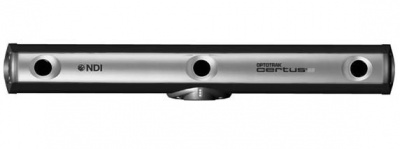Difference between revisions of "Optotrak"
Jump to navigation
Jump to search
| Line 11: | Line 11: | ||
| − | Optotrak Startup Sequence | + | '''Optotrak Startup Sequence''' |
Revision as of 08:56, 31 July 2015
Optotrack Certus
Startup Sequence
Media:OptotrakStartupSequence.docx
Optotrak Startup Sequence
- Turn on powerrails.
- Turn on computers and log in.
- Turn on ODAU unit (when used) and wait for it to beep. If the ODAU unit is not used, don’t turn it on.
- Turn on Sensor Unit 1 and wait for it to beep. Remove caps.
- Turn on Sensor Unit 2 (when used) and wait for it to beep. Remove caps. If sensor unit 2 is not used, don’t turn it on.
- Turn on Control Unit and wait for it to beep.
- Start First Principles and load your First Principles experiment. The used units will beep.
- When not all used units are found, make sure that the units you use are turned on, and that all other units are turned off. Close First Principles an restart First Principles. If still not all used units are found, press the button labeled ‘Query system’. If that still doesn’t find all units, contact Hubert Voogd from TSG.
- Align Sensor Units (when using more than one sensor unit).
- Define coordinate system.
- Connect IRED markers.
- Place IRED markers on subject, AFTER BEING SURE THAT THE IREDS ARE NOT GETTING TOO HOT!
Manuals
- First Principles User Guide: Media:First_Principles_User_Guide(IL-1070104_Rev3).pdf
- Optotrak Certus User Guide rev 6: Media:Optotrak_Certus_User_Guide_rev_6(IL-1070106).pdf
- Optotrak Certus Marker Strober Guide: Media:Optotrak_Certus_Marker_Strober_Guide(IL-1070074).pdf
- Optotrak Certus Tool Strober Guide: Media:Optotrak_Certus_Tool_Strober_Guide(IL-1070076).pdf
- Optotrak Certus 3020 Strober Adapter Guide: Media:Optotrak_Certus_3020_Strober_Adapter_Guide(IL-1070075).pdf
- Optotrak Data Acquisition Unit II Guide (ODAU unit): Media:Optotrak_Data_Acquisition_Unit_II_Guide(IL-1070028).pdf
- NDI 6D Architect User Guide (usefull for making rigid body files): Media:NDI_6D_Architect_User_Guide(IL-1070059).pdf
- How to make Rigid Body files, RIG File Creation Procedure: Media:NDI_LS Division-RIG_File_Creation_Procedure_R1.1.pdf
- NDI DataView User Guide: Media:NDI_DataView_User_Guide(IL-1070088).pdf
- Optotrak Application Programmers Interface Guide. Usefull when you are creating your own software that communicates with the Optotrak System. We advise however to use First Principles to record your data and communicate with First Principles by using the RTC3D Protocol that is descibed in the link below this one. Media:Optotrak_Application_Programmers_Interface_Guide(IL-1070086).pdf
- RTC3D Protocol, use this protocol when you write your own software, to communicate with First Principles. Media:RTC3D_protocol_rev4.pdf
- RTC3D examples: Media:RTC3D_client_for_customers.zip
- Delphi Component that implements an RTC3D client that can connect to First Principles. Written by Hubert Voogd. Can also be used as a source base to write code in other languages. Media:ClientSocketsPackage.zip
- Python code that implements an RTC3D client that can connect to First Principles. Written by Wilbert van Ham. Can also be used as a source base to write code in other languages. https://github.com/wilberth/Rudolph/blob/master/fpclient.py

